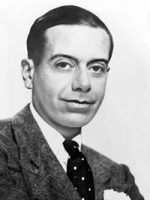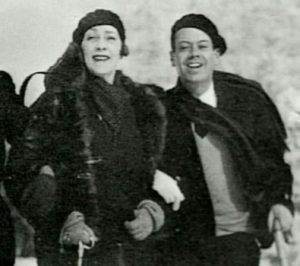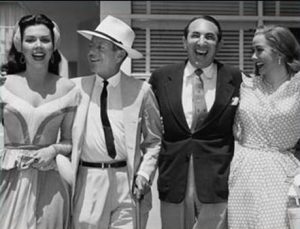
Cole Albert Porter (June 9, 1891 – October 15, 1964)
Porter, Cole
Cole Porter (birth name Cole Albert Porter) (born June 9, 1891, Peru, Indiana, U.S. – died October 15, 1964, Santa Monica, California, U.S.) was an American composer and songwriter. He wrote more than 800 songs (both words and music) for over 30 stage and film musicals. Cole Porter handled both music and lyrics with ease, and conquered Broadway and Hollywood with his witty songs. His work includes Night and Day and I've Got You Under My Skin, and Broadway musicals Kiss Me Kate, Can-Can and Silk Stockings.
Contents
BIOGRAPHY
Background
Cole Porter was born into a wealthy family in Peru, Indiana, on June 9, 1891. Cole’s father, Samuel Fenwick Porter, was a pharmacist, his mother, Kate Cole Porter, was the daughter of wealthy businessman J.O. Cole.
Childhood
Young Cole benefitted from his grandfather’s wealth and had a privileged childhood. Porter received considerable musical training as a child. He began music lessons under his mother’s watchful eye, studying the violin at the age of six and the piano at eight, practicing two hours a day. By the age of 10, Cole was already composing songs. By 1901, he had composed a onesong operetta entitled The Song of the Birds; then he produced a piano piece, The Bobolink Waltz, which his mother published in Chicago. Although Cole’s grandfather disapproved of his interest in music, his mother supported him.
Education
Still, grandfather Cole insisted the boy was to be a lawyer, and so he was sent to Worcester Academy in Massachusetts in 1905, an elite private school from which he graduated in 1909 as class valedictorian. That summer he toured Europe as a graduation present from his grandfather. In the autumn, he entered Yale University, where he composed music for various clubs’ plays and productions. After Yale, Cole entered Harvard Law School in an attempt to please his grandfather, however, he changed his course of study to music. It is said that his mother hid this fact from his grandfather.
Career and personal life
With his musical education from Harvard, Cole went to New York to look for work. His first song to make it to Broadway, Esmeralda, was in the revue Hands Up in 1915, and he followed this modest success with a full-length show, See America First (1916).
He moved to Paris in 1917 during World War I and spread the rumor that he fought in the French Foreign Legion, when in fact he spent his time partying and socializing with people like Pablo Picasso, F. Scott Fitzgerald and Ernest Hemingway. While in Paris, Cole Porter met Linda Lee Thomas, a wealthy divorcée eight years his senior, who became his best friend and whom he married in 1919. The Porters began a lifetime of travelling on a grand scale.

Cole Porter with his wife Linda
Porter contributed songs to various stage shows and films and in 1923 composed a ballet, Within the Quota, which was performed in Paris and New York. Songs such as Let’s Do It (1928), What Is This Thing Called Love (1929), You Do Something to Me (1929), and Love for Sale (1930), Night and Day (1932), I Get A Kick Out Of You (1934), Begin the Beguine (1935), My Heart Belongs to Daddy (1938), Don’t Fence Me In (1944), I Love Paris (1953), I’ve Got You Under My Skin, In the Still of The Night, You’d Be So Nice To Come Home To, True Love, Just One Of Those Things, Anything Goes, From This Moment On, You’re The Top, Easy to Love and many more, established him as a creator of worldly, witty, occasionally risqué lyrics with unusual melodic lines to match.

In Hollywood, Porter with Ann Miller, Jack Cummings, and Kathryn Grayson.
Porter also wrote the musical scores for such movies as Born to Dance, Rosalie, Broadway Melody of 1940, You’ll Never Get Rich, Something to Shout About, High Society and Les Girls.
In October 1937 Cole Porter’s life was changed by a riding accident that left him crippled and in pain for the rest of his life. Doctors judged that his legs might both have to be amputated, but Porter staunchly refused. He underwent thirty-four surgeries over the next twenty years, but, in 1958, his right leg had to be amputated.
Cole continued to compose music, some of which appeared in hit movies. In the late 1940s and 1950s, his Broadway musicals Kiss Me Kate, Can-Can and Silk Stockings were very successful. Kiss Me Kate was so superior that it won a Tony Award in 1949.
Later Years and Death
Porter's wife died in 1954. Despite his years of extramarital homosexual relationships, she had been a source of friendship and support, and her death was a blow for Porter, he escaped into alcohol and painkillers. Cole Porter died in 1964 and is buried in his home town, Peru, Indiana, between his wife and his father.
SHEET MUSIC
You can find and download free scores of the composer:
1 Comment
Mark · 07.09.2019 at 04:03
Whose transcription of Cole Porter’s “All of You”?